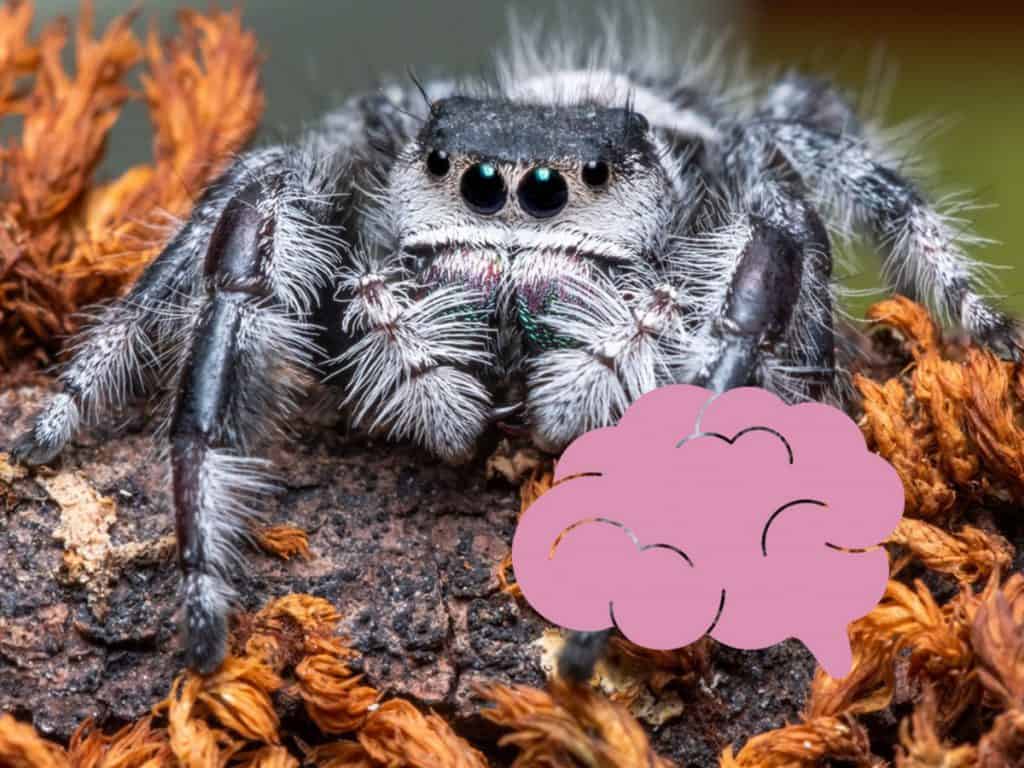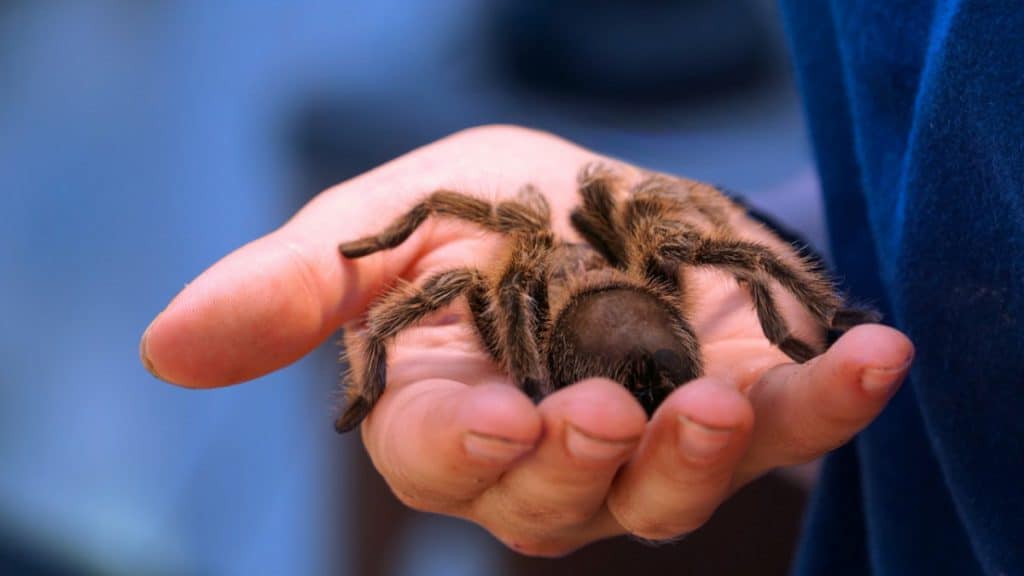
If you enjoy reading this article, why not check out our articles on What Are Scorpions? The Complete Answer and What Can Spiders Die From? The Curious Answer
Do Tarantulas and Spiders Have Brains?
Defining a “Brain,” As We Know It
When you ask if Tarantulas or spiders, in general, have brains, it somewhat comes down to how exactly you define a “Brain.” When we think of more complex mammals we keep as pets (just as with Tarantulas) or on farms like cats, dogs, cows, or sheep we think of the brain as a big processing mechanism handling loads of data and helping us with considering complex tasks or dealing with emotions.
Do spiders have feelings?
Spiders do not have emotions or think about something like how 2+2=4. Instead, they have a concentration of neural cells that forms an incredibly complex neuro system that actually takes up more and more space in their body the smaller the spider is to the point its neuro-processing system can make-up over 80% of its body.
How intelligent is a spider?
Hence, a spider does not have a “Brain,” in a traditional sense but depending on how you look at it has a surprisingly complex brain if you consider all the instincts and processing it is doing for things like hunting, eating, weaving webs (for spiders that weave webs, Tarantulas do not), and the “Thinking,” required for successfully mating. In other words, spiders do have a brain, just not in the regular way we think of one–but the kind of, “Brain,” they do have is fascinating and has led to some incredible research as scientists are just starting to understand spider and tarantula brains further.
Not, “Intelligent,” in the Traditional Sense, but Full of Unexpected Complexity
Spiders often have a centralized brain the size of maybe a pin-head. This, “Brain,” as it were is so small because spiders do not need a central area for things like debating morality, feeling happy, feeling sad, considering if they like another spider, dislike another spider, or other more complex emotions seen in humans or more advanced mammals.
Do spiders have a good memory?
Spiders need that central spot for the processing of all the nerves that extend through the rest of their body and make them surprisingly complex in terms of their nerve-system. This system allows rapid movement for hunting, avoiding danger, and the like.
How smart are tarantulas?
Tarantulas are actually among the least-studied of spiders when it comes to their nerves, not because they are uninteresting but because it is fascinating how smaller spiders actually have more and more nerves taking-up space in their body. Tarantulas are less small so they have more space in their bodies for the nerves.
How All These Nerves Fit
This nerve-system can extend throughout the abdomen and into the legs even with nerves taking up-to 25% of a spider’s body-space in its legs and as mentioned above 80% of the body in a smaller spider (that can result in the somewhat bulging-appearance sometimes on a spider’s head and body, the brain is literally poking-out of the exoskeleton on smaller spiders). With humans we have nerves all throughout our body but quite a large brain as it is busy as the processing center for everything our nerves observe.
What sensory structures are present in spiders?
Spiders use less of a centralized-center and instead all the nerves are firing and assisting with immediate actions like hunting, running, jumping on prey, or otherwise allowing the spider to move fast and quickly when needed, hence so much nerves in the body and less dedicated to a brain as spiders do not need to, “Think,” about their hunger so much as to simply satisfy it. Larger spiders have more space for nerves but small and slim ones like a Brown Recluse will find a great deal of their body dedicated to the neural system (such that amazing 80% statistic).
Do Tarantulas Learn or are They at Least Smarter than Other Spiders?

Tarantulas and spiders do not learn in the traditional sense that they, “Understand,” something, but do learn in that they recognize doing an action leads to a reaction. For example, people have, “trained,” Tarantulas to a point one will have its processing comprehend that when it is picked up by a human repeatedly and held without being harmed that it does not need to associate being held with danger.
Again, though, this is not a case of the Tarantula actually thinking in the sense it is going, “Hey, this person picks me up and then sets me down gently, I know I am safe,” so much as its processing is recognizing a pattern of being picked-up, held, and then set back down without danger. It is all action and reaction. Tarantulas do have larger bodies and brains that allow some more processing, so in a way you could argue they learn more than other spiders, but as has been said, it all depends on how you actually define the idea of a spider having a brain or learning.
If you are interested in learning more about how tarantulas feel, check out our article Do Tarantulas Like Being Stroked?
Do Tarantulas Have Feelings of Joy or Sadness?
A Tarantula and any other spider would have felt in the sense it would know it is hungry and need to eat, or that it is fertile and needs to mate. A spider can feel content in its terrarium, with its neurological systems recognizing the humidity is good, there are places to hide, and there is food to eat. With that in mind, a spider can also sense if it is in an environment less-friendly to it surviving which can stress the spider out (in a neuro-processing sense) and result in it trying to escape an enclosure via climbing (Tarantulas that are stressed can often be observed trying to escape from their tanks via climbing-out).
A Tarantula does not actually feel, “Happy,” or, “Sad,” however. It does not think, “Hey, my owner is opening the lid to give me some crickets, I like them!” It instead senses the arrival of its food and instinctively, “Knows,” to then hunt and eat.
No Such Thing as “Nice,” or, “Mean,” as We Know it
Some individuals who own pet Tarantulas may tell you stories about all the zany personalities they observe. They might say how they have one who can’t wait to be held and another that always seems to be in a “bad mood.” Well, these owners are engaging in an act known as, “Anthropomorphism,” which is a fancy way of saying they are applying human qualities and emotions to animals that lack them.
Feel Love, Sadness, and Joy Just like Human
A Tarantula does not like or dislike anyone. They are not nice and do not feel guilty about eating bugs or enjoy biting humans.
They simply are and lack any true personality as they honestly lack the brain for it. More complex creatures such as our pet dogs and cats do in fact have a personality and may very well be friendly or standoffish, but a Tarantula or any other spider lacks the brain capacity to, “Care,” about anything in the human sense.
Not So Much Love or Romance as an Urge to Mate
Tarantulas feel, “Love,” in the sense they have a primal urge to have bred, but not in the manner that they want to exchange a bouquet of roses or sit around enjoying each other’s company–they want to have sex and nothing else. It really is all about mating, such as in a situation where a female would be aware of a male’s display of its suitability for breeding (Tarantulas do a dance) is of a high-enough quality to expose her genitals and mate–with mating providing a pleasurable sensation as it always does so that all animals want to reproduce.
With that said, Tarantulas do not feel, “Romance,” as we understand it where a male and female are smitten with each other or want to be a caring couple. It is more a case of a biological urge to reproduce that results in spiders doing so, and once they are done there is no emotion involved–with many species of female spiders actually eating the male after mating to provide nutrients for the egg-laying process (clearly if the female eats the male after sex there is little, “Love,” lost)!
Should Keep a Tarantula as a Pet if it Doesn’t, “Feel,” Any Way About You?
From reading this piece you might feel a little discouraged at the idea of having a Tarantula as a pet knowing it dos not actually appreciate or, “Love,” you the way another pet might. Well, don’t fell that way! They still are fascinating creatures and make fun pets that are relatively easy to care for and incredibly interesting to watch.
Plants don’t even have a neural system at all as we know it yet people love to keep them as pets, so just because a Tarantula or any other spider may not literally feel appreciation for you taking care of it in an emotional sense, it will, “Know,” it is content and in a place that is comfy, has food, and otherwise allows it to live its best life according to its instincts.
If you are seriously considering having a pet spider, read our article The Three Best Kinds of Spiders to Keep as Pets to gather information!
Even if a Tarantula or other spider does not have a “Brain,” in the sense we associate with complex animals, they still are full of neurological processing power and are amazing to behold. Even if a Tarantula will never look-up at you and say, “Thanks for taking great care of me!” it will still be fully aware it is in a great environment–and you’ll know you are the person to thank for that!
If you enjoyed reading this article, why not check out our articles on What Can Spiders Bite and Chew Through? and What Are the Biggest Bugs in America?
Recent Posts
Tiny Black Bugs in Bathroom NO WINGS: What They Are and What to Do!
Finding tiny black bugs in your bathroom can be uncomfortable, to say the least. Especially if they are persistent, or they appear in very large numbers, which they often like to do. When it...
Tiny Black Bugs in Plant Soil - What Are They & What To Do About It
A short horror story: You get a new houseplant. You do your best to take care of it. You’ve ensured that it has the right soil, the right amount of sun, it gets enough water. And then one day, you...

